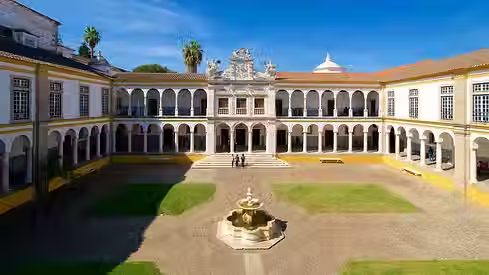Evora
Set in the heart of Portugal’s Alentejo region, Évora is a city steeped in history, charm, and timeless beauty. A UNESCO World Heritage Site, Évora’s roots stretch back over two millennia, bearing witness to Roman, Visigothic, Moorish, and Portuguese Christian rule. This rich past is reflected in its remarkably preserved monuments, cobbled streets, and whitewashed houses with wrought-iron balconies. Surrounded by medieval walls, Évora invites visitors to slow down and discover its layered heritage at a gentle pace. As one of Portugal’s most culturally significant towns, it was once an important center of learning and religion, and today it offers a harmonious blend of archaeology, architecture, and gastronomy. For Muslim travelers, Évora’s long Islamic history—visible in its urban layout and architectural details—adds depth to the experience. With its welcoming atmosphere, compact walkable center, and deep historical roots, Évora is a gem for those seeking an authentic encounter with Portugal’s soul beyond the coastal crowds.

Sights in Evora
Temple of Diana
One of the best-preserved Roman monuments in Portugal, the Temple of Diana dates back to the 1st century. With its Corinthian columns rising gracefully in the city center, it’s a powerful reminder of Évora’s Roman past and offers a striking contrast to the surrounding medieval and Moorish architecture.


Cathedral of Évora
This massive granite cathedral, built between the 12th and 14th centuries, combines Romanesque and Gothic styles. Visitors can climb to the rooftop for panoramic views of the city and Alentejo countryside. The structure’s sheer scale and quiet cloisters invite reflection and appreciation of Portugal’s medieval Christian legacy.
Chapel of Bones
A unique and haunting site, the Chapel of Bones is adorned with the bones and skulls of over 5,000 monks. Built in the 16th century, it’s a place meant to encourage contemplation about life and death. Despite its macabre appearance, the chapel is part of a beautiful Franciscan complex with rich spiritual significance.


University of Évora
Founded in 1559, this is Portugal’s second-oldest university and remains an important cultural institution. Housed in a former Jesuit college, the university features a remarkable mix of classical and Mannerist architecture, elegant cloisters, and traditional azulejos. Guided tours offer insight into the city’s academic and intellectual history.
